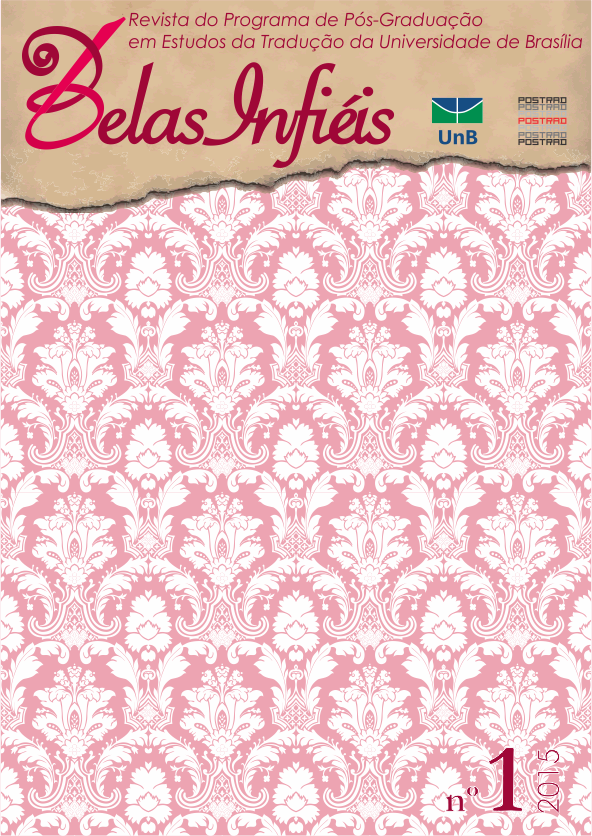LA BELLE ET LA BETE, DE MME LEPRINCE DE BEAUMONT, EM TRES TRADUÇÕES BRASILEIRAS CONTEMPORANEAS
DOI:
https://doi.org/10.26512/belasinfieis.v4.n1.2015.11309Palabras clave:
contos, tradução literária, literatura francesa do século XVIIIResumen
A escritora francesa Mme Leprince de Beaumont viveu parte de sua vida em Londres como tutora de jovens da aristocracia inglesa, onde sua obra Magasin des Enfants (1757) foi publicada. Essa coletânea inclui um dos contos mais conhecidos de todos os tempos, La Belle et la Bête, e constitui um marco para a literatura infanto-juvenil. Trata-se de uma adaptação didática e moralizante para o universo infantil do conto de Mme de Villeneuve, de título homônimo, publicado 17 anos antes e voltado ao público adulto. Este artigo propõe análise de três traduções brasileiras contemporâneas do conto de 1757, direcionadas ao público infanto-juvenil.
Descargas
Citas
CRANE, Walter.Beauty and the Beast. Londres: George Routledge and Sons, 1874.
D’AULNOY, Mme; LEPRINCE DE BEAUMONT, Mme. A Bela e a Fera e outros contos de fadas. Tradução de Renata Cordeiro. São Paulo: Princípio, 2007.
GENETTE, Gérard. Paratextos Editoriais. Tradução de Álvaro Faleiros. São Paulo: Ateliê Editorial, 2009.
LATAPIE, Sophie. Un dispositif intégré. Féeries, Grenoble, n. 1, p. 125-144, 2004. Disponível em http://feeries.revues.org/76. Acesso em 03/05/2015.
LEFEVERE, André. Tradução, reescrita e manipulação da fama literária. Tradução de Claudia Matos Seligmann. Bauru-SP: Edusc, 2007.
LEPRINCE DE BEAUMONT, Mme. Bela e a Fera. Tradução de Marie-Hélène C. Torres. São Paulo: Poetisa, 2014.
LEPRINCE DE BEAUMONT, Mme. Le Magasin des enfants par Mme Leprince de Beaumont. Paris : Delarue, 1859. Disponível em http://www.gallica.fr. Acesso em 15/08/2013.
PERRAULT, C. et al. Contos de Perrault, Grimm, Andersen e outros. Tradução de Maria Luiza X. de A. Borges. Rio de Janeiro: Jorge Zahar, 2010.
Descargas
Publicado
Cómo citar
Número
Sección
Licencia
Copyright Statement
Given the public access to this journal, the texts are free to use but requires the recognition of the original authorship and initial publication in this journal to be properly stated.
The journal allows the use of works published for non-commercial purposes, including the right to submit the work to publicly accessible databases. Published contributions are the sole and exclusive responsibility of the author(s).
- When submitting papers to be evaluated by the Belas Infiéis journal, the author(s):
- Declare that the contents of the contributions are original and of their original creation, being entirely responsible for their content if there is an objection by third parties.
- Claim to be aware that they should not commit academic plagiarism.
- Declare that the manuscript has not been published, completely or partially, in Portuguese or another language. If it is a translation it should be submitted to the Translated Articles section.
- Declare that the manuscript is not being evaluated by other journals.
- Declare that the manuscript was not submitted to another journal simultaneously.
- Commit(s) to inform the journal of any kind of error or inaccuracy in their contribution (published, in evaluation or in editing) and to collaborate with the editors to make due corrections of the article (when in evaluation or editing) or erratum/retraction (after publication).
- Declare that there is no conflict of interest regarding the published work.
- Authorize its release if it is accepted for publication without any kind of monetary compensation.
- Agree to assign non-exclusive rights to publication to the magazine, remaining free to make their contribution available in other media as long as the publication of the first version in Belas Infiéis magazine is mentioned. They also authorize Belas Infiéis to assign their texts for reproduction in content indexers, virtual libraries and similar platforms.
- Maintain copyright and grant the journal the right of first publication, the work being licensed under theCreative Commons Attribution License.
- Is/Are allowed and encouraged to publish and distribute their work online after the editorial process, which may increase the impact and citation of the published work.
- Authorize the editorial team to make textual adjustments and to adapt the article to the publication rules, when necessary.



















